Venetia Stanley
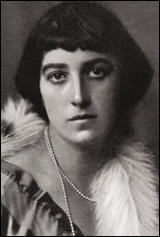
Venetia Stanley was born at Easthorpe, Malton, on 22nd August 1887. She was the youngest of the seven children to survive to adulthood of Edward Lyulph Stanley, who succeeded as fourth Baron Stanley of Alderley in 1903 and Mary Bell Stanley. (1)
In 1907 she became close friends with Violet Asquith, the daughter of H. H. Asquith, the Chancellor of the Exchequer, who two years later was to become the British prime minister. In their letters Venetia and Violet constantly professed undying love for one another. Violet also sent her presents:"I’ve sent you a tiny and very humble gift which you must wear always (in your bath and in your bed) and if you think it too ugly you may tuck it in under your combies." (2)
Venetia accompanied Violet and her father on a trip to Sicily in 1912. Also on holiday with them was the young Liberal Party MP, Edwin Montagu. Over the next two weeks both men fell in love with Venetia. Asquith, was 59 years old at the time and in a letter to her later he described the holiday as "the first stage in our intimacy... we had together one of the most interesting and delightful fortnights in all our lives... the scales dropped from my eyes… and I dimly felt… that I had come to a turning point in my life". (3)
On their return from holiday Asquith invited Venetia to a house party, following this up with invitations to 10 Downing Street. However, he was unaware that Montagu was also besotted with Venetia. He wrote to her regularly and took her out whenever he could. It seems that Asquith was totally unaware of this developing relationship. In August 1912 he asked her to marry him. At first she accepted the proposal and later changed her mind. (4)
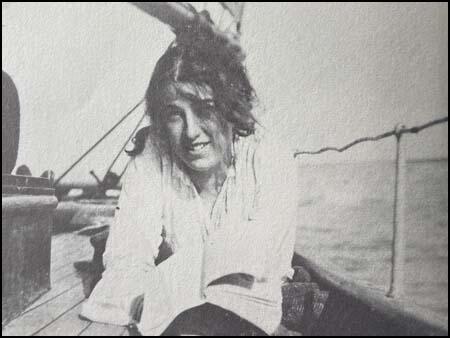
If Venetia accepted his proposal he would have lost his inheritance as his father, Samuel Montagu, 1st Baron Swaythling, who had died in 1911, had stipulated in his will that he had to marry a Jewish woman. "Although Venetia, physically repelled by his huge head and course pock-marked face, refused him, she lapped up the waspish political gossip at which he excelled, and they continued to see a great deal of one another, with Montagu a regular house guest at the Stanley family homes at Alderley and Penrhos." (5)
Venetia Stanley and H. H. Asquith
Lawrence Jones, who knew her during this period, commented: "Venetia had dark-eyed, aquiline good looks and a masculine intellect. I delighted in her and we were close friends; but she permitted herself, in the morning of her youth, no recourse to her own femininity. She carried the Anthologies in her head, but rode like an Amazon, and walked the high garden walls of Alderley (her family's home in Cheshire) with the casual stride of a boy. She was a splendid, virginal, comradely creature, reserving herself for we knew not what use of her fine brain and hidden heart." (6)
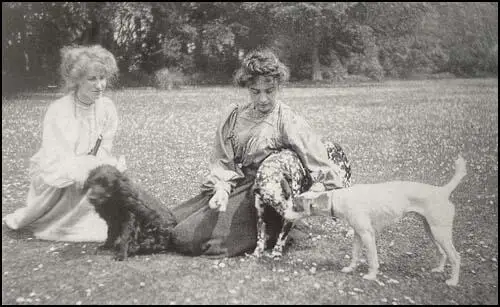
In 1913 Asquith began to write to Venetia Stanley on a regular basis and would meet her in London as often as possible. She admitted to Edwin Montagu: "It was delicious seeing him again... He was in very good spirits I thought in spite of the crisis (over Ireland). He didn't, as you can imagine, talk much about it and our conversation ran in very well worn lines, the sort that he enjoys on these occasions and which irritate Margot so much by their great dreariness. I love every well known word of them - with and for me familiarity in a large part of the charm." (7)
Venetia Stanley began to spend more time with the Asquith family at 10 Downing Street. However, in the presence of his wife, Margot Asquith, he spent little time with her. After staying with them for over a week she told Montagu: "I saw not very much of the P.M. Do you remember saying how much he varied in his liking for me, and that sometimes he quite liked me and at others not at all? Well, this was one of the not at all times. He was horribly bored by my constant presence at breakfast, lunch and dinner". (8)
Although she "had few pretensions to beauty", she was superbly equipped to be what Violet Asquith's called her father's "companion in brightness". Asquith admitted that he had "a slight weakness for the companionship of clever and attractive women" and became one of what his wife called his "little harem". Another attraction for Asquith was that Venetia showed no great anxiety to marry and settle down. (9)
Edwin Montagu continued to try to persuade Venetia to marry him. Both his brother, Louis Montagu, 2nd Baron Swaythling, and his sister, Lilian Montagu, put pressure on him to stop seeing Venetia. He was told that "Christians are all so totally unlike the Jews". Venetia's sister, Sylvia Henley, thought that she was fond of Montagu and liked his company but did not love him. "After all, she could hardly even bare to kiss him. And if she was not in love with him, what would happen if she really fell in love with someone else?" (10)
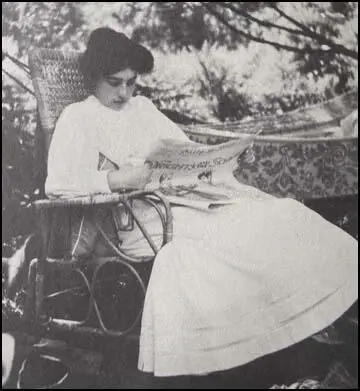
During this period Asquith was writing to Venetia explaining how she had become her "pole-star" who had rescued him "from sterility, impotence, despair" and his love for her enabled him "in the daily stress of almost intolerable burdens and anxieties, to see visions and dreams". Despite his passionate love letters, according to Venetia's friend, Diana Cooper, the relationship remained platonic. However, Bobbie Neate, the author of Conspiracy of Secrets (2012) believes that Venetia gave birth to Asquith's child in August 1911. From the evidence available this seems very unlikely. (11)
Robert Harris also believes that Asquith and Venetia had a sexual relationship. "It has always been suggested this was more of a fantasy relationship than a real love affair... But there are paragraphs left out of his published letters to her that indicate it was much more. He wrote notes to Venetia, then in her late 20s, during crucial cabinet meetings and clearly sought her advice, as well as sending her love poetry – lines from Tennyson and Browning... I became fascinated by this aspect of Asquith's story. We can account for so much of his time in the run-up to the first world war, but this enabled me to tell that story day by day through the 560 letters Venetia kept." (12)
There are several accounts of Asquith attempting to seduce young women in his company. Diana Cooper complained that on several occasions she had to defend her face "from his fumbly hands and mouth". (13) The Asquith family were fully aware of his inappropriate behaviour. His daughter-in-law, Cynthia Asquith, wrote about it in her diary but according to her biographer, Nicola Beauman, she was forced to "ink over all references in her diary". Ottoline Morrell was another woman who complained about his behaviour. Apparently she told Lytton Strachey that Asquith "would take a lady's hand, as she sat beside him on the sofa, and make her feel his erected instrument under his trousers". (14)
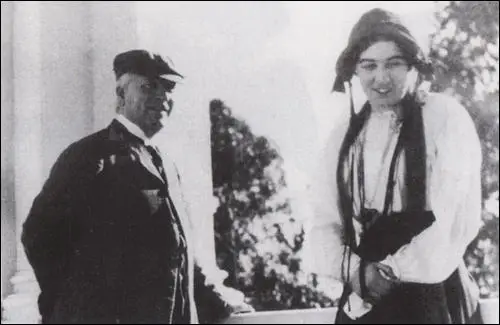
Venetia’s younger sister, Sylvia Henley, also complained about Asquith and commented that if she ever found herself alone with Asquith, "it was safest to sit either side of the fire... or to make sure there was a table between them." Another woman recalled an incident when "the Prime Minister had his head jammed down in to my shoulder and all my fingers in his mouth." (15)
Asquith wrote to Venetia about all his political problems. Edwin Montagu, encouraged her in this letter writing. "If he (Asquith) wins (secures agreement over Ulster) you first will share his triumph, if he loses you alone can make it tolerable... Don't you know what you are to him? How amused you can afford to be at his relaxation. Those who know you both would laugh at a comparison between your relations with him and those of any other woman in the world." (16)
Margot Asquith complained to Venetia's family about the relationship. Her sister, Blanche Stanley, defended the relationship to her mother: "It would no doubt be very difficult now to break off what is, after all, a very delightful friendship... I always feel Venetia is very safe, which is the main thing, as it is her cleverness and intellectual side that is involved much more than her affections, though no doubt she is very fond of P.M." (17)
First World War
After the outbreak of the First World War Asquith began writing to Venetia daily. This included a "great many political and war secrets, and remained, as far as is known, completely discreet about them all". Venetia became concerned that Asquith was becoming increasing dependence on her friendship, and to have warned him that he could not remain the centre of her life. However, she found it difficult to break with him when she saw how much she had distressed him she would "make him happy again" by saying "anything he wanted". (18)
H. H. Asquith destroyed all the letters that he received from Venetia. However, she kept all of the letters she received from him. In 1914 Asquith was 62 and she was 28. Throughout that year Asquith wrote to Venetia at least once a day, sometimes two, three or four times a day. (19) As Nicholas Coleridge has pointed out: "The Post Office in 1914 provided twelve collections and deliveries of letters per day in London, and generally three per day in the countryside, and Stanley and her maid spend much time hanging about the letterbox, waiting for the latest love bomb from the prime minister." (20)
It has been argued that this relationship had an impact on Asquith's attitude towards world events. On 6th July 1914 The Morning Post warned that Austrian reactions to the assassination might lead to a "European war". (21) Later that day Asquith sent Venetia a letter from the War Office telling her he had "began another" book by Charles Dickens (Our Mutual Friend). He was also concerned about the eyesight of Edward Grey, his Foreign Secretary. "It was quite pleasant driving up this morning, but I have been assailed since I arrived by a succession of small and middle-sized worries. Edward Grey's eyes are not satisfactory, and he thinks of returning to the country with perhaps a fortnightly visit to London." He ends the letter with the words: "I wonder what you are doing tonight and tomorrow? Let me know... My darling you don't know how I miss you." (22)
Asquith continued to discuss domestic political events with Venetia but ignored the possibility of a European war. He was especially interested in developing a good relationship with Alfred Harmsworth, Lord Northcliffe, who now owned The Times and who had recently reduced its price to 1d. After telling her that his comments about Northcliffe were "most secret" he added: "He has been 'doing' Ulster, and is much struck with the Convenanters, whom he regards as a very formidable tho' most unattractive crew. I talked over the question of areas etc with him, & tried to impress upon him the importance of making The Times a responsible newspaper." (23)
On 3rd August, 1914, Asquith told his chief whip, Joseph Pease, that the crisis in Europe had put "Ulster into the shade". He added: "The one bright spot was the settlement of Irish strife... God moves in a mysterious way his wonders to perform." (24) The following day Asquith announced that the country was at war with Germany. Later he told Venetia that "the sudden outburst of the Great War" had been the greatest stroke of luck in his political career. (25)
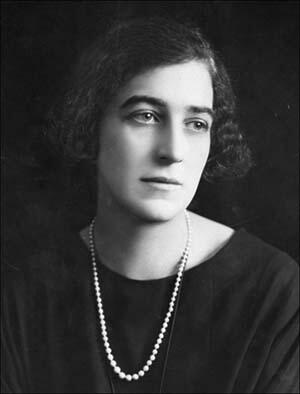
The First World War did not prevent H. H. Asquith from having regular meetings with Venetia Stanley . In fact, during the early months of the war Asquith used his official prime minister car, a 1908 Napier, on Friday afternoons, to carry out his sexual relationship with Venetia. Robert Harris believes that the fittings of the car allowed this to take place: "It was not how we might imagine now. It was totally sealed, like a bedroom on wheels, with blinds on the windows and only a push-button intercom to speak to the driver." (26)
In his letters Asquith tells Venetia the most vital war secrets: how many men and guns were committed where and the most closely held plans. As far as is known, Venetia did not pass this information on to anyone else. Some of the letters were written from Number 10, some from the Committee of Imperial Defense; many were scribbled during cabinet meetings. He also describes in detail disputes he is having with fellow government ministers and senior army officers such as Lord Horatio Kitchener. (27)
Christopher Andrew, the official historian of MI5, revealed in 2018, that in 1914 Asquith showed "carbon copies of the latest intelligence" while they both sat in the PM car. After she read it, "what he would do is tear it into pieces. Then he would put them into little paper balls – the most secret information available in Britain at the time – and he would toss them out the window." Andrew argued that a week later Scotland Yard came round with "a little cardboard box which contained the little paper balls". When he was questioned, Asquith feigned innocence and told them he had no idea how they had ended up there. (28)
Asquith's language became more passionate in 1915 and appeared to be more besotted with his young friend. "I love you more than ever - more than life!" (29) Six days later he wrote: "I can honestly say that not an hour passes without thought of you." (30) These letters were written at a time of national crisis and newspapers, especially those owned by Lord Northcliffe, were suggesting he was a poor war leader. On 22nd March, Asquith told Venetia that "I have never wanted you more." (31)
When she suggested going overseas to work as a nurse with the British troops Asquith protested that he would not be able to cope with her "so far away". In several letters he expressed his fears of losing her. He confessed that "sometimes a horrible imagination seizes me that you may be taken from me - in one way or another". If she did try try to go abroad he feared she would be a victim of a submarine attack and this developed "a suicidal mood" in him. (32)
Margot Asquith became increasingly jealous of Venetia and after an outburst of anger he wrote a letter about his situation. He explained how he had been under tremendous pressure: "These last 3 years I have lived under a perpetual strain, the like of which has I suppose been experienced by very few men living or dead. It is no exaggeration to say that I have on hand more often half-a-dozen problems than a single one - personal, political, Parliamentary etc - most days of the week... I admit that I am often irritated and impatient, and then I become curt and perhaps taciturn. I fear you have suffered from this more than anyone, and I am deeply sorry, but believe me darling it has not been due to want of confidence and love. Those remain and will always be unchanged."
He then went on to argue that Venetia had been very helpful during this period. "You have and always will have (as no one knows so well as I) far too large a nature - the largest I have known - to harbour anything in the nature of petty jealousies. But you would have just reason for complaint, and more, if it were true that I was transferring my confidence from you to anyone else. My fondness for Venetia has never interfered and never could with our relationship. She has a fine character as well as great intelligence, and often does less than justice to herself (as over this Hospital business) by her minimising way of talking." (33)
Marriage to Edwin Montagu
On 30th March, 1915, Asquith wrote to Venetia four times. Disturbed by his intense love of her she decided to bring an end to the relationship by marrying Edwin Montague. He had recently joined the cabinet as Chancellor of the Duchy of Lancaster. John Grigg has pointed out: "Still only in his middle thirties, he had risen in politics as Asquith's protégé but was far from being a mere hanger-on... Rich and privileged, intellectually a late-developer, sensitive and emotional yet capable of a certain ruthlessness, he was now becoming a rather important figure." (34)
Montagu now had status as well as money. Venetia Stanley decided to accept his proposal of marriage. "For Montagu, religion was a purely personal affair; he had no formal religious beliefs, was anti-Zionist, and constantly emphasized his foremost identity as a Briton". However, in order that Montagu could continue to receive an annual income of £10,000 from his father's estate, Venetia was compelled to convert to Judaism. (35)
On 12th May 1915, Asquith was shocked and appalled to receive Venetia's letter announcing her engagement to the man who he recently appointed as his Chancellor of the Duchy of Lancaster. Asquith replied that this news "breaks my heart" and that he "couldn't bear to come and see you". (36)
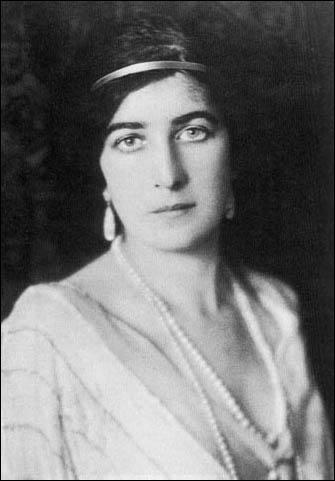
On the day he heard the news Asquith wrote three letters to Venetia's sister, Sylvia Henley, about the proposed marriage. In the second letter he pointed out: "I had never any illusions, and often told Venetia: and she also was always most frank about her someday getting married. But this. We have always treated it as a kind of freakish, but unimaginable venture. I don't believe there are two living people who, each in their separate ways, are more devoted to me than she and Montagu: and it is the way of fortune that they two should combine to deal a death-blow to me."
Asquith then went on to assess Venetia's choice as husband including: "I am really fond of him, recognise his intellectual merits, find him excellent company and have always been able to reckon on his loyalty and devotion. Anything but this! It is not merely the prohibitive physical side (bad as that is) - I won't say anything about race and religion though they are not quite negligible factors. But he is not a man: a shamble of words and nerves and symptoms, intensely self absorbed, and - but I won't go on with the dismal catalogue." (37)
Violet Asquith was also upset by the news: "Curious and disturbing news reached us on Wednesday evening of Montagu's engagement to Venetia... Montagu's physical repulsiveness to me is such that I would lightly leap from the top story of Queen Anne's Mansions - or the Eiffel Tower itself to avoid the lightest contact - the thought of any erotic amenities with him is enough to freeze one's blood. Apart from this he is not only very unlike and Englishman - or indeed a European - but also extraordinarily unlike a man... He has no robustness, virility, courage, physical competency - he is devoured by hypochondria - which if it does not spring from a diseased body must indicate a very unhealthy mind." (38)
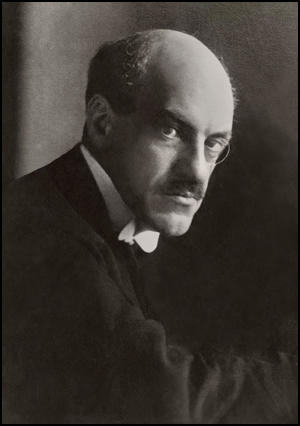
Margot Asquith was pleased the relationship was over. She told her daughter: "That want of candour in Venetia is what has hurt him but she has suffered tortures of remorse poor darling and I feel sorry for her... He is wonderful over it all - courageous, convinced and very humble. They were both old enough to know their own minds and no one must tease them now. There's a good deal of bosh in the religion campaign, though superficially it takes one in... It is Montagu's physique that I could never get over not his religion". (39)
The marriage between Venetia Stanley and Edwin Montagu took place on 26th July 1915, a few days after she had been received into the Jewish faith. Montagu's old friend from university, Raymond Asquith, defended the marriage: "I am entirely in favour of the Stanley/Montagu match. (i) Because for a woman any marriage is better than perpetual virginity, which after a certain age (not very far distant in Venetia's case) becomes insufferably absurd. (ii) Because, as you say yourself, she has had a fair chance of conceiving a romantic passion for someone or other during the last 12 years and has not done so and is probably incapable of doing so. This being so I think she is well advised to make a marriage of convenience. (iii) Because, in my opinion, this is a marriage of convenience. If a man has private means and private parts (specially if both are large) he is a convenience to a woman. (iv) Because it annoys Lord and Lady Sheffield. (v) Because it profoundly shocks the entire Christian community." (40)
Venetia Stanley, Sylvia Henley and Anthony Henley
In 1915 Sylvia Henley's husband, Anthony Morton Henley, was promoted to the rank of Lieutenant-Colonel and joined the staff of General John French, the Commander-in-Chief of the British Expeditionary Force (BEF) on the Western Front. Sylvia complained about his lack of letters and after Venetia's marriage to Edwin Montagu, she took over as Asquith's main confidante. Margot Asquith actually encouraged the relationship and she thought it would help her husband deal with losing Venetia. However, his daughter, Violet Asquith, did not agree as she "sensed a new, more dangerous challenge to her father's affections". (41)
Sylvia Henley kept her husband informed about Asquith's growing affection for her. She wrote to him about a weekend she spent at Asquith's house. "As we went to bed, the PM said he must show me his room. I was rather against this, as his affectionate nature gets the better of his wisdom, as you know. But there was no gainsaying him. We were standing talking, his arm around me, of books... I knew for certain he would exact a kiss from me, and knowing this I was glad it should be one of sympathy for that part of his life that I know about. And I told him how much love and sympathy I felt for him and kissed him - he can't do without affection... To me it is always a blot that the PM cannot like one without the physical side coming in so much. I should like him so much better if he held my hand and did not paw so much." (42)
In another letter later that month Sylvia told her husband that Venetia was upset that Asquith had turned his affections to her: "I am certain it cuts her to see the PM is fond of me." He began to take her out in his car and she claimed that she was able to "cajole the PM out of his sullen mood". Sylvia told her husband she was doing her "patriotic duty" in consoling Asquith: "He is now very fond of me in just the most wonderfully nice way. I hope our relations will never change." (43) On 2nd June 1915, Asquith told Sylvia: "You are my anchor and I love you and need you." (44)
Sylvia had to constantly fend off his physical approaches, such as kissing or enveloping arms. She told him that she loved being with him she did not want it to become a sexual relationship. Sylvia insisted "that so long as it remained platonic there was nothing I wanted more, but as soon as I felt there was a danger of that form of love giving place to the other - it must be all over." (45) Asquith replied that "an erotic adventure was never my idea". (46)
Sylvia also attempted to promote her husband's career and went on a car drive with General William Robertson where she argued that he should be given an active field command. However, she constantly complained about Henley's lack of letters from France. This turned to fury when she discovered that he was writing regularly to her sister, Venetia. She demanded to see the letters, but Venetia refused, but she did tell her that Henley had used the words "I long to be with you". Sylvia wrote to her husband: "I see you're so false, telling me I am everything to you. And now I know that as you said it, you were longing to be with her and not me." (47)
Sylvia Henley warned her husband that she would allow herself to get even closer to Asquith: "A rudderless ship is so easily blown onto a sea shore". When she told Asquith about the situation he gave her a ring and tried to persuade her to wear it on the little finger on her right hand. Venetia continued to write intimate letters to Anthony Morton Henley. This included a reference to meeting at a hotel at Folkestone on 12th July, 1915. (48)
Marriage in Difficulty
It was not a happy marriage as their "relationship lacked passion". It has been claimed that Venetia had lesbian tendencies. According to Sylvia Henley, Venetia had told Montagu that "sex would only take place on her terms, should she want it, but that she should also be free to seek it elsewhere". (49) This resulted in several affairs. Edwin was almost certainly not the father of her daughter, Judith, who was born on 6th February 1923. It is believed that the father was William Ward, 3rd Earl of Dudley. (50)
Duff Cooper wrote that: "The relations of Edwin and Venetia are very distressing. She seems hardly to be able to bear him - she cannot help showing it and he cannot help seeing it." Cooper, who was a Conservative Party MP, had little sympathy for Montagu: "I no longer like and cannot pity him... He is a man incapable of inspiring trust, confidence or lasting love. He has no friends or followers either in politics or in private life. He has great qualities of charm and intellect but they are all warped by something, which I believe to be a mixture of cowardice, jealousy and suspicion." (51)
Venetia conversion to Judaism rankled with society hostesses, for it seemed to some she had "deserted her class" and this apparent disloyalty caused "continued sniping behind her back". Despite this she "could still hook and reel in some of the most influential men in the country". This included a relationship with Lord Beaverbrook, the owner of The Daily Express. (52)
Venetia Montagu also joined her friends, Diana Manners and Katherine Asquith in taking drugs such as chloroform and morphia. Duff Cooper recorded in his diary how he and Patrick Shaw-Stewart joined a group of friends in a drug-fuelled evening. Manners wrote to Raymond Asquith and confessed to takin g drugs on a regular basis. (53)
Edwin Montagu died of arteriosclerosis on 15th November, 1924. A public memorial service, was held on 21st November in the West London Synagogue, which Venetia did not attend. He left his property equally divided between Venetia and Judith. (54)
Final Years
Venetia wrote to Asquith on her husband's death: "I know it is is not necessary for me to tell you how deeply he loved you and what a lasting grief your political separation was. He always used to say that though he was still absorbingly interested in his work after he left you, it was no longer any fun." (55)
H. H. Asquith now developed other close relationships with other women during this period. These women were usually "married and therefore convention allowed close friendships to flourish with the opposite sex". (56) This included the actress, Viola Tree, Pamela McKenna, the wife of the cabinet member, Reginald McKenna, the sculptress Kathleen Scott, Christabel McLaren (later Lady Aberconway) and Hilda Harrison, whose husband had been killed during the First World War. (57)
In 1931, Venetia Stanley Montagu embarked on a 6,000 mile adventure in a De Havilland Gypsy Moth piloted by Rupert Belleville. Of the journey she said that, "We are going for fun only, in the simplest, cheapest, and most modern way of seeing the world". (58)
Although she was rejected by most of society she remained close to Winston Churchill and his wife, Clementine. During the Second World War she regularly visited their weekend retreat at Ditchley Park near Charlbury in West Oxfordshire. (59)
Venetia Stanley Montagu died of cancer at her Norfolk home, Breccles Hall, near Attleborough, on 3rd August 1948.
Primary Sources
(1) Lawrence Jones, An Edwardian Youth (1956)
Venetia had dark-eyed, aquiline good looks and a masculine intellect. I delighted in her and we were close friends; but she permitted herself, in the morning of her youth, no recourse to her own femininity. She carried the Anthologies in her head, but rode like an Amazon, and walked the high garden walls of Alderley (her family's home in Cheshire) with the casual stride of a boy. She was a splendid, virginal, comradely creature, reserving herself for we knew not what use of her fine brain and hidden heart.
(2) Edwin Montagu, letter to Venetia Stanley (8th March, 1914)
If he (Asquith) wins (secures agreement over Ulster) you first will share his triumph, if he loses you alone can make it tolerable... Don't you know what you are to him? How amused you can afford to be at his relaxation. Those who know you both would laugh at a comparison between your relations with him and those of any other woman in the world.
So show him you acknowledge his right to any amusement he chooses in order that he may give every ounce of himself for the struggle. Show him how confident you are of him and yourself and you will prove to be once again the big minded great loving Margot, who has no more loyal admirer and friend.
(3) H. H. Asquith, letter to Margot Asquith (14th April, 1914)
Your letter made me sad, and I hasten to tell you that you have no cause for the doubts and fears which it expresses, or suggests.
You have and always will have (as no one knows so well as I) far too large a nature - the largest I have known - to harbour anything in the nature of petty jealousies. But you would have just reason for complaint, and more, if it were true that I was transferring my confidence from you to anyone else. My fondness for Venetia has never interfered and never could with our relationship.
She has a fine character as well as great intelligence, and often does less than justice to herself (as over this Hospital business) by her minimising way of talking. She is even now trying to arrange for a fresh spell of what is to her not at all congenial work.
I wish, with you, that Violet had rather more of the same sense of the futility of much of the life they have been leading.
But to come back to the main point, I never consciously keep things back from you and tell them to others. These last 3 years I have lived under a perpetual strain, the like of which has I suppose been experienced by very few men living or dead. It is no exaggeration to say that I have on hand more often half-a-dozen problems than a single one - personal, political, Parliamentary etc - most days of the week. I am reputed to be of a serene "imperturbable" temperament, and I do my best in the way of self-control. But I admit that I am often irritated and impatient, and then I become curt and perhaps taciturn. I fear you have suffered from this more than anyone, and I am deeply sorry, but believe me darling it has not been due to want of confidence and love. Those remain and will always be unchanged.
(4) H. H. Asquith, letter to Sylvia Henley (12th May, 1915)
Since I wrote to you this morning I have gone through a Cabinet, a luncheon with Prince Paul of Serbia and Sir R. McBride of British Columbia and a rather searching question time at the House and I hope I got through them all without any sign of disquietude or impotence. All the same, I don't suppose there is in the kingdom at this moment a much more unhappy man.
I had never any illusions, and often told Venetia: and she also was always most frank about her someday getting married. But this. We have always treated it as a kind of freakish, but unimaginable venture. I don't believe there are two living people who, each in their separate ways, are more devoted to me than she and Montagu: and it is the way of fortune that they two should combine to deal a death-blow to me... I am really fond of him, recognise his intellectual merits, find him excellent company and have always been able to reckon on his loyalty and devotion. Anything but this!
It is not merely the prohibitive physical side (bad as that is) - I won't say anything about race and religion though they are not quite negligible factors. But he is not a man: a shamble of words and nerves and symptoms, intensely self absorbed, and - but I won't go on with the dismal catalogue...
She says at the end of a sadly meagre letter: "I can't help feeling, after all the joy you've given me, that mine is a very treacherous return". Poor darling: I wouldn't have put it like that. But in essence it is true: and it leaves me sore and humiliated.
Dearest Sylvia, I am almost ashamed to write to you like this, and I know you won't say a word to her of what I have written. But whom have I but you to turn to? in this searching trial, which comes upon me, when I am almost overwhelmed with every kind and degree of care and responsibility. Don't think that I am blaming her: I shall love her with all my heart to my dying day; she has given me untold happiness. I shall always bless her. But - I know you will understand. Send me a line of help and sympathy.
(5) Violet Asquith, diary entry (14th May, 1915)
Curious and disturbing news reached us on Wednesday evening of Montagu's engagement to Venetia... Montagu's physical repulsiveness to me is such that I would lightly leap from the top story of Queen Anne's Mansions - or the Eiffel Tower itself to avoid the lightest contact - the thought of any erotic amenities with him is enough to freeze one's blood. Apart from this he is not only very unlike and Englishman - or indeed a European - but also extraordinarily unlike a man... He has no robustness, virility, courage, physical competency - he is devoured by hypochondria - which if it does not spring from a diseased body must indicate a very unhealthy mind. As against this he has imagination, ambition, fire in his stomach (my favourite quality!) and real generosity and powers of devotion. A better friend than lover I should say.
I asked Montagu about the religious difficulty - he replied "we can get round that". I have since learned that by getting round it - he meant Venetia going through it. This shocked me to the marrow. To renounce England and Christianity - even if one has never held it - at the dead bidding of foul old Lord Swaythling and to secure his filthy £10,000 a year - for that to renounce one's religion and take on a new one - become a Jew - seems to me the most impossibility, squalidly cynical antic.
It is true that Venetia believes nothing - has no spiritual "apprehension" whatever - but she then is not entitled to masquerade as a believing of the case. She seemed quite calm - rather cheerful than happy - admitted she felt no "glow" about it and used one phrase which haunted me "there was nothing else much there". I cannot help feeling she would have done anything else if there had been.
(6) Maurice Bonham Carter, letter to Violet Asquith (4th June, 1915)
We met Venetia in Boulogne, she seemed very well but I had little talk with her, as she saw your father for some time and then had to go back to her hospital. I was rather beastly to her I am afraid but I was rather angry that she had turned up and should want to see your father, though I daresay it may have done no harm. I cannot help feeling that having cut herself adrift I do not want anything to be done which may reopen relations, save on a permanent and satisfactory basis, and unless this can be done it is wrong and cruel to attempt it.
(7) Margot Asquith, letter to Violet Asquith (7th June, 1915)
Father is happier over Venetia's marriage though not converted - he thinks he would mind less were it anyone else but I tell him whoever she married he would mind deeply as he has been very much in love - he says if she had only told him he would have felt it less. That want of candour in Venetia is what has hurt him but she has suffered tortures of remorse poor darling and I feel sorry for her... He is wonderful over it all - courageous, convinced and very humble. They were both old enough to know their own minds and no one must tease them now. There's a good deal of bosh in the religion campaign, though superficially it takes one in... It is Montagu's physique that I could never get over not his religion.
(8) Raymond Asquith, letter to Conrad Russell (24th July, 1915)
Your letter is a powerful indictment, and though I don't agree with it I am glad to see that a year of soldiering has not blunted the edge of your pen. It has turned mine into a ploughshare... I am entirely in favour of the Stanley/Montagu match. (i) Because for a woman any marriage is better than perpetual virginity, which after a certain age (not very far distant in Venetia's case) becomes insufferably absurd. (ii) Because, as you say yourself, she has had a fair chance of conceiving a romantic passion for someone or other during the last 12 years and has not done so and is probably incapable of doing so. This being so I think she is well advised to make a marriage of convenience. (iii) Because, in my opinion, this is a marriage of convenience. If a man has private means and private parts (specially if both are large) he is a convenience to a woman. (iv) Because it annoys Lord and Lady Sheffield. (v) Because it profoundly shocks the entire Christian community.
Of course I see your point when you say you wouldn't like to go to bed with Edwin. I don't mind admitting that I shouldn't myself. But you must remember that women are not refined, sensitive delicate-minded creatures like you and me: none of them have much physical squeamishness and Venetia far less than most. You say she must have weighed the consequences and so she did, quite carefully: but what frightened her most was not the prospect of the bed being too full but of the board being too empty. She was afraid that her friends might give her up in disgust; but after sounding a few of them - Katharine e.g. and Diana - she concluded that it would be all right and decided to flout the interested disapproval of Mr. H. H. and the idiotic indignation of Miss V. Asquith.
Your character sketch of Edwin is done in much too dark colours. You are obviously prejudiced against him by the fact (if fact it be) that he steals birds' eggs, a vice utterly immaterial in a bride-groom. I agree that he has not a drop of European blood, but then neither has he a drop of American. I don't agree that he is a wet-blanket in Society. He is moody certainly, but is capable of being extremely amusing and (specially during the last year) has succeeded in attracting some very critical and some very beautiful women. He is broadminded, minded, free from cant, open to new impressions, tolerant of new people. I do not think he will be either a dull or a tyrannical husband, and I understand that the terms of alliance permit a wide licence to both parties to indulge such extra conjugal conjugal caprices as either may be lucky enough to conceive.
(9) John Preston, The Daily Mail (10th June, 2016)
While there’s no proof that they had a physical relationship, Venetia and Violet constantly professed undying love for one another, as well as sending each other little presents. "I’ve sent you a tiny and very humble gift which you must wear always (in your bath and in your bed)," wrote Violet, "and if you think it too ugly you may tuck it in under your combies."
So who was Venetia Stanley, the object of not only the Prime Minister’s affections, but his daughter’s, too? On the surface, she came from an impeccably conventional aristocratic family. Peer a little more closely, though, and what emerges is anything but conventional.
It seems quite possible that Venetia’s uncle may also have been her father. Certainly there were lots of rumours to that effect and her mother was known to have had an affair with her husband’s brother. Despite Venetia possessing what one friend of hers called "a gruff baritone voice", Asquith thought her the most alluring woman he’d ever met..
When Venetia announced her engagement to an extremely drippy man called Edwin Montagu - Secretary of State for India - the Prime Minister was heartbroken.
However, he didn’t repine for long, swiftly transferring his attentions to Venetia’s younger sister, Sylvia. Initially flattered, Sylvia soon discovered that if she was alone with Asquith, "it was safest to sit either side of the fire... or to make sure there was a table between them."
Not that she was the only object of his attentions. By today’s standards, Asquith was a serial groper. One woman recalled an incident when "the Prime Minister had his head jammed down in to my shoulder and all my fingers in his mouth"...
When Edwin died in 1924, Venetia literally took to the air, buying herself an airplane and whizzing around the Middle East with yet another of her lovers. By now some of her old friends, appalled by all this conjugal carnage, had given her up as a bad lot.
But not Winston Churchill and his wife, Clementine, who had always been fond of Venetia - she’d been a bridesmaid at their wedding. During World War II they regularly invited her to their weekend retreat at Ditchley Park in Oxfordshire.
.
Student Activities
1832 Reform Act and the House of Lords (Answer Commentary)
The Chartists (Answer Commentary)
Women and the Chartist Movement (Answer Commentary)
Benjamin Disraeli and the 1867 Reform Act (Answer Commentary)
William Gladstone and the 1884 Reform Act (Answer Commentary)
Richard Arkwright and the Factory System (Answer Commentary)
Robert Owen and New Lanark (Answer Commentary)
James Watt and Steam Power (Answer Commentary)
Road Transport and the Industrial Revolution (Answer Commentary)
Canal Mania (Answer Commentary)
Early Development of the Railways (Answer Commentary)
The Domestic System (Answer Commentary)
The Luddites: 1775-1825 (Answer Commentary)
The Plight of the Handloom Weavers (Answer Commentary)
Health Problems in Industrial Towns (Answer Commentary)
Public Health Reform in the 19th century (Answer Commentary)
Walter Tull: Britain's First Black Officer (Answer Commentary)
Football and the First World War (Answer Commentary)
Football on the Western Front (Answer Commentary)
Käthe Kollwitz: German Artist in the First World War (Answer Commentary)
American Artists and the First World War (Answer Commentary)
References
(1) Michael Brock, Venetia Stanley Montague: Oxford Dictionary of National Biography (2004-2014)
(2) John Preston, The Daily Mail (10th June, 2016)
(3) Michael Brock, H.H. Asquith: Letters to Venetia Stanley (1982) page 532
(4) Jonathan Walker, The Blue Beast: Power and Passion in the Great War (2012) page 138
(5) Colin Clifford, The Asquiths (2002) page 190
(6) Lawrence Jones, An Edwardian Youth (1956) page 214
(7) Venetia Stanley, letter to Edwin Montagu (November 1912)
(8) Michael Brock, H.H. Asquith: Letters to Venetia Stanley (1982) page 2
(9) Michael Brock, Venetia Stanley Montague: Oxford Dictionary of National Biography (2004-2014)
(10) Jonathan Walker, The Blue Beast: Power and Passion in the Great War (2012) page 147
(11) Bobbie Neate, Conspiracy of Secrets (2012) page 190
(12) Vanessa Thorpe, The Observer (25th August 2024)
(13) Naomi B. Levine, Politics, Religion and Love (1991) pages 232-235
(14) Nicola Beauman, Cynthia Asquith (1987) page 195
(15) John Preston, The Daily Mail (10th June, 2016)
(16) Edwin Montagu, letter to Venetia Stanley (8th March, 1914)
(17) Adelaide Lubbock, People in Glass Houses (1977) page 82
(18) Michael Brock, H.H. Asquith: Letters to Venetia Stanley (1982) page 558
(19) Godfrey Hodgson, New York Times (3rd April 1983)
(20) Nicholas Coleridge, The Independent (26th August, 2024)
(21) The Morning Post (6th July, 1914)
(22) H. H. Asquith, letter to Venetia Stanley (6th July, 1914)
(23) H. H. Asquith, letter to Venetia Stanley (15th July, 1914)
(24) Joseph Pease, diary entry (3rd August, 1914)
(25) H. H. Asquith, letter to Venetia Stanley (10th March, 1915)
(26) Vanessa Thorpe, The Observer (25th August 2024)
(27) Godfrey Hodgson, New York Times (3rd April 1983)
(28) Christopher Andrew, The Daily Mail (26th June, 2018)
(29) H. H. Asquith, letter to Venetia Stanley (12th February, 1915)
(30) H. H. Asquith, letter to Venetia Stanley (18th February, 1915)
(31) H. H. Asquith, letter to Venetia Stanley (22nd March, 1915)
(32) Colin Clifford, The Asquiths (2002) page 266
(33) H. H. Asquith, letter to Margot Asquith (14th April, 1915)
(34) John Grigg, Lloyd George, From Peace To War 1912-1916 (1985) page 240
(35) Chandrika Kaul, Edwin Montague: Oxford Dictionary of National Biography (2004-2014)
(36) H. H. Asquith, letter to Venetia Stanley (12th May, 1915)
(37) H. H. Asquith, letter to Sylvia Henley (12th May, 1915)
(38) Violet Bonham Carter, diary entry (14th May, 1915)
(39) Margot Asquith, letter to Violet Asquith (7th June, 1915)
(40) Raymond Asquith, letter to Conrad Russell (24th July, 1915)
(41) Jonathan Walker, The Blue Beast: Power and Passion in the Great War (2012) page 145
(42) Sylvia Henley, letter to Anthony Morton Henley (9th May, 1915)
(43) Sylvia Henley, letter to Anthony Morton Henley (21st May, 1915)
(44) Sylvia Henley, letter to Anthony Morton Henley (2nd June, 1915)
(45) Sylvia Henley, letter to Anthony Morton Henley (29th May, 1915)
(46) H. H. Asquith, letter to Sylvia Henley (18th June, 1915)
(47) Sylvia Henley, letter to Anthony Morton Henley (16th July, 1915)
(48) Venetia Stanley Montagu, letter to Anthony Morton Henley (27th October, 1915)
(49) Jonathan Walker, The Blue Beast: Power and Passion in the Great War (2012) page 148
(50) Chandrika Kaul, Edwin Montague: Oxford Dictionary of National Biography (2004-2014)
(51) John Julius Norwich, The Duff Cooper Diaries (2005) pages 85 and 97
(52) Jonathan Walker, The Blue Beast: Power and Passion in the Great War (2012) page 178
(53) John Julius Norwich, The Duff Cooper Diaries (2005) page 24
(54) Michael Brock, Venetia Stanley Montague: Oxford Dictionary of National Biography (2004-2014)
(55) Venetia Stanley, letter to H. H. Asquith (18th November, 1924)
(56) Jonathan Walker, The Blue Beast: Power and Passion in the Great War (2012) page 162
(57) Colin Clifford, The Asquiths (2002) page 472
(58) Tom Moulson, The Millionaires' Squadron: The Remarkable Story of 601 Squadron and the Flying Sword (2014) page 46
(59) John Preston, The Daily Mail (10th June, 2016)

